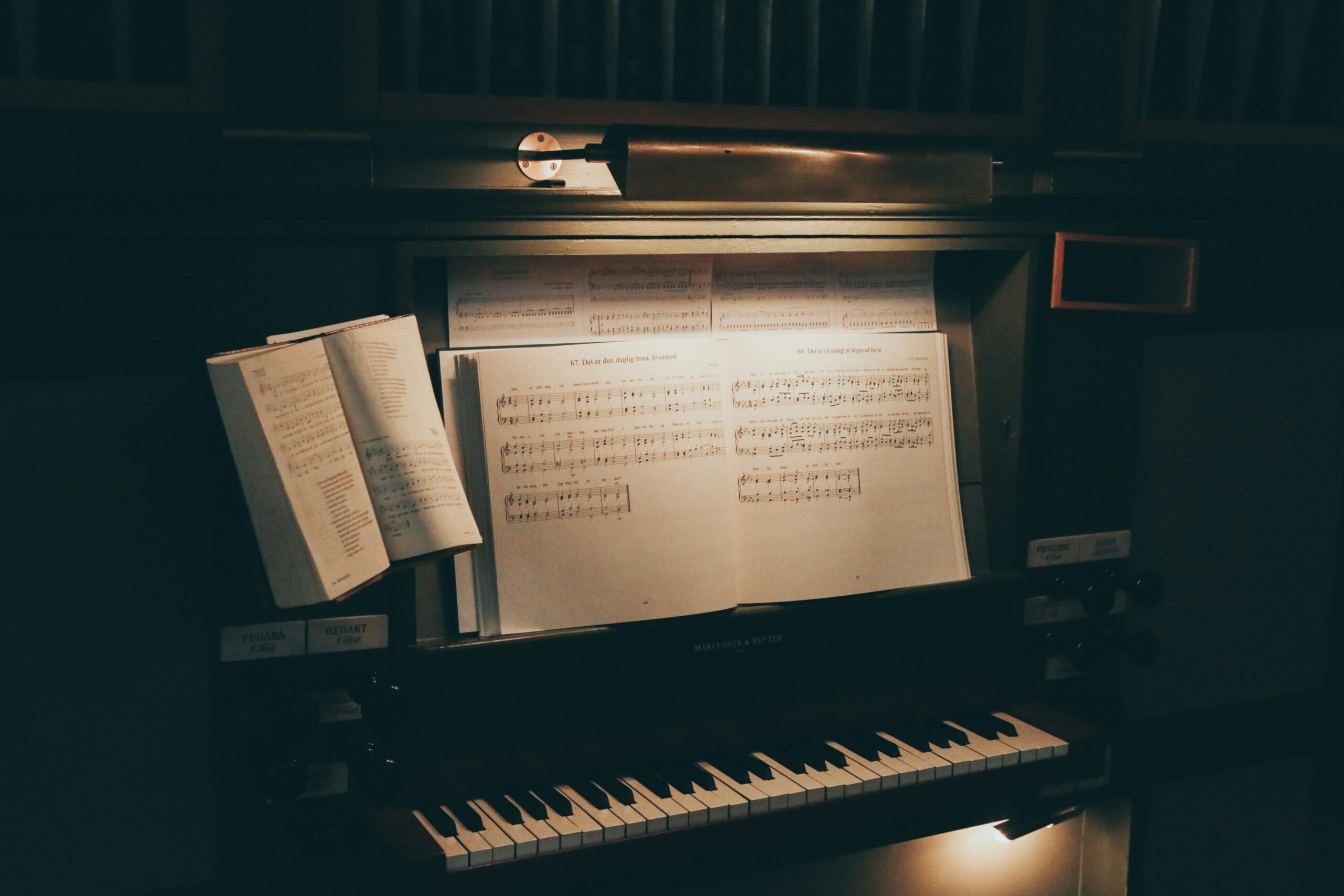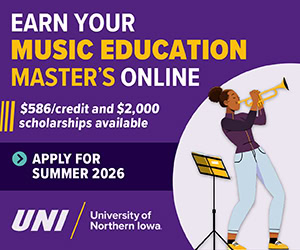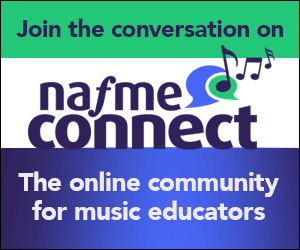/ News Posts / Preparing Musicians for Lives They Love
Preparing Musicians for Lives They Love
By NAfME Member José Valentino Ruiz, Ph.D.
Music educators carry a remarkable responsibility: preparing students to lead a high school band, produce professional-level tracks in a studio, or captivate audiences as performers—all while helping them build lives that are meaningful, sustainable, and joy-filled.
The stakes are high. Most college students today are anxious about finding work after graduation, and many openly question the value of their degree. In music programs, the pressure is intensified by the need to meet high standards in pedagogy, performance, and production, ensuring graduates are “job ready” the moment they leave campus.
But here’s the question we have to ask ourselves—are we giving equal weight to preparing them for lives they actually love living?
Leonard Bernstein once observed, “Music can name the unnameable and communicate the unknowable.” That’s a reminder that music, at its best, is not just a career—it’s a lifeline to joy, purpose, and human connection. The real challenge is harmonizing career readiness with quality of life (QoL) so that our students thrive both professionally and personally.
Why Career Readiness Needs to Be in Tune with Quality of Life
Imagine a student who has mastered every performance, aced every pedagogy class, and secured a teaching or industry job right after graduation—yet feels burned out, disconnected, and unsure how to integrate personal fulfillment into their daily reality.
Across higher education, the emphasis on career readiness has sharpened, with employers seeking candidates skilled in communication, critical thinking, and adaptability. For music programs, this translates into rigorous training in teaching methods, music technology, studio production, and public performance. These skills are essential, and students who receive them are more likely to land jobs, stay employed, and advance in their fields.
But career skills alone don’t guarantee a fulfilling life. Students who pursue intrinsic goals—like personal growth, artistic purpose, and community impact—tend to report higher satisfaction and resilience. By contrast, those chasing external markers of success such as fame or income often find themselves facing burnout and diminished joy in their work.
Time and again, music-making itself proves to be a major driver of well-being. Ensemble rehearsals, creative collaborations, and teaching practicums foster social connection, empathy, and a sense of belonging—qualities that not only enrich personal life but also make for more effective educators and artists.
Yet, too many music graduates leave school strong on technical ability but underprepared for the realities of their chosen path—whether that’s managing a classroom, running a production business, or balancing a performance career with personal commitments. Students from first-generation, low-income, or underrepresented backgrounds often face even greater obstacles, as opportunities for internships, mentorships, and networking tend to be unevenly distributed.
Defining Quality of Life for Music Students
For musicians, QoL goes beyond the paycheck or professional title. It’s about living in alignment with personal values, maintaining creative freedom, nurturing meaningful relationships, and having the energy and resources to pursue artistic visions without constant exhaustion.
It includes the freedom to accept gigs or projects that resonate, the flexibility to explore multiple creative outlets, and the ability to balance professional obligations with personal well-being. Programs that integrate cultural awareness, inclusivity, and mentorship create environments where students not only refine their skills but also discover who they want to be as people and artists.
Younger generations of musicians increasingly seek guidance that addresses the whole person—not just the performer, producer, or teacher. That’s a call for us to show up as more than technical instructors; we must be career coaches, creative collaborators, and trusted mentors.
A Seven-Step Plan to Align Career Preparation with Quality of Life
Here’s a framework for music programs to integrate QoL into the heart of their mission without losing sight of professional excellence:
- Integrate Life Design Principles
Encourage students to envision careers that align with personal values. Have them explore how conducting a choir, producing an album, or teaching a class could serve both their ambitions and their community. - Train Faculty as Whole-Person Advisors
Equip educators to address not just musical skill but also life balance, resilience, and long-term planning. Incorporate tools and conversations that help students navigate both professional and personal growth. - Guarantee Experiential Learning for All
Make hands-on experiences like student teaching, internships, recording projects, and live performances accessible to every student—not just those who can afford them. - Reframe Career Services for Artists
Offer guidance that helps students choose work based not only on salary but also on alignment with their artistic identity and life goals. - Cross-Train Skills across Disciplines
Blend music courses with studies in entrepreneurship, technology, and cultural studies to help students see the broader applications of their skills. - Use Technology to Expand Mentorship
Connect students with industry professionals around the world through virtual mentorship, especially in programs with limited local resources. - Break Down Structural Barriers
Provide financial support, resources, and networks for students who face systemic obstacles to career development.
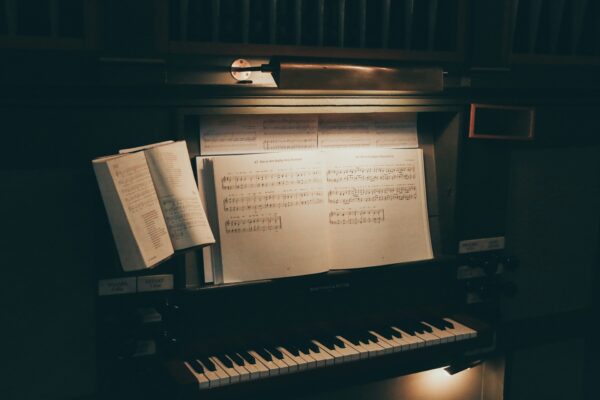
Photo by Nick Karvounis on Unsplash
Challenges That Could Disrupt the Harmony
No plan is without hurdles. Small programs may struggle to fund expanded services or mentorship initiatives. Faculty already balancing heavy loads might need additional support to advise students in holistic ways. For students under financial pressure, immediate income needs may outweigh QoL considerations—at least in the short term.
Another challenge is measuring QoL. Unlike tracking job placement rates or salaries, well-being is more nuanced and subjective—closer to capturing the spirit of a jazz improvisation than following a written score. That’s why we need ongoing dialogue, experimentation, and reflection within our programs.
The Global Context: Where Students Will Live and Work
Today’s musicians often imagine careers that extend beyond their hometowns—or even their home countries. Some will teach in international schools, others will produce music for global streaming audiences, and many will work remotely while performing live in multiple regions.
Work-life balance varies dramatically across the world. Certain countries offer a high quality of life but at significant cost, while others provide vibrant creative scenes with fewer formal structures. Preparing students for this reality means teaching adaptability, financial literacy, and community-building skills so they can thrive wherever they choose to live and work.

Photo by dominik hofbauer on Unsplash
Entrepreneurship: Creating Your Own Score
Many students want to launch their own teaching studios, production houses, or music festivals. Yet entrepreneurship education in music often leans too heavily on generic business frameworks that fail to address the unique realities of creative enterprise.
The solution lies in connecting students with active artists, producers, and cultural leaders who can mentor them in real-world contexts. Building incubators for student-led projects and fostering community partnerships can help them develop the practical know-how to turn ideas into sustainable ventures.
Final Cadence
Music education has the power to do far more than prepare students for their first job—it can equip them for a lifetime of artistry, purpose, and connection.
If we embrace both career readiness and quality of life as core outcomes, we can graduate musicians who are not only technically skilled but also deeply fulfilled. That’s a vision worth pursuing. And when we succeed, our students won’t just be ready for work—they’ll be ready for lives they love.
About the author:
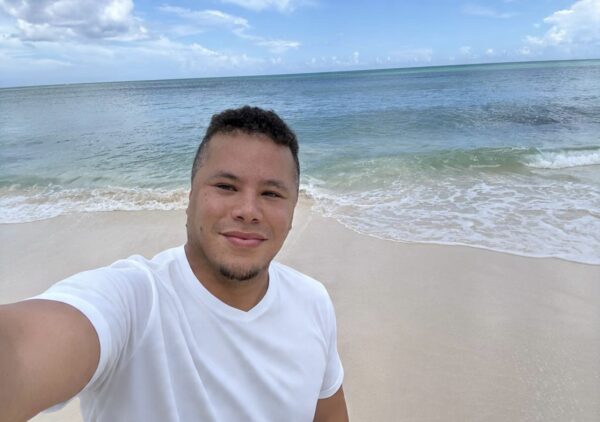 NAfME member Dr. José Valentino Ruiz enjoys multiple streams of career opportunities as a multi–Latin GRAMMY® Award-winning and EMMY® Award-winning artist, composer, producer, scholar, and entrepreneur. He serves as Founder, Coordinator, & Associate Professor of Music Business & Entrepreneurship at the University of Florida, and as the first-ever U.S. Speaker of Creative Economy & Global Arts Entrepreneurship for the U.S. Department of State. As Owner and CEO of JV Music Enterprises LLC, Dr. Ruiz has produced more than 150 albums, authored more than 200 scholarly publications, and delivered keynote addresses, workshops, and residencies across six continents. His work bridges performance, education, research, and cultural diplomacy, empowering musicians and creative leaders to thrive in a global marketplace. For collaborations, bookings, and speaking engagements, contact: hello@josevalentino.com. Follow Dr. Ruiz at @josevalentinomusic on Instagram.
NAfME member Dr. José Valentino Ruiz enjoys multiple streams of career opportunities as a multi–Latin GRAMMY® Award-winning and EMMY® Award-winning artist, composer, producer, scholar, and entrepreneur. He serves as Founder, Coordinator, & Associate Professor of Music Business & Entrepreneurship at the University of Florida, and as the first-ever U.S. Speaker of Creative Economy & Global Arts Entrepreneurship for the U.S. Department of State. As Owner and CEO of JV Music Enterprises LLC, Dr. Ruiz has produced more than 150 albums, authored more than 200 scholarly publications, and delivered keynote addresses, workshops, and residencies across six continents. His work bridges performance, education, research, and cultural diplomacy, empowering musicians and creative leaders to thrive in a global marketplace. For collaborations, bookings, and speaking engagements, contact: hello@josevalentino.com. Follow Dr. Ruiz at @josevalentinomusic on Instagram.
Did this blog spur new ideas for your music program? Share them on Connect! Interested in reprinting this article? Please review the reprint guidelines.
The National Association for Music Education (NAfME) provides a number of forums for the sharing of information and opinion, including blogs and postings on our website, articles and columns in our magazines and journals, and postings to our Connect member portal. Unless specifically noted, the views expressed in these media do not necessarily represent the policy or views of the Association, its officers, or its employees.
Published Date
August 26, 2025
Category
- Careers
- Collegiate
- Quality
- Teacher Self Care
Copyright
August 26, 2025. © National Association for Music Education (NAfME.org)
